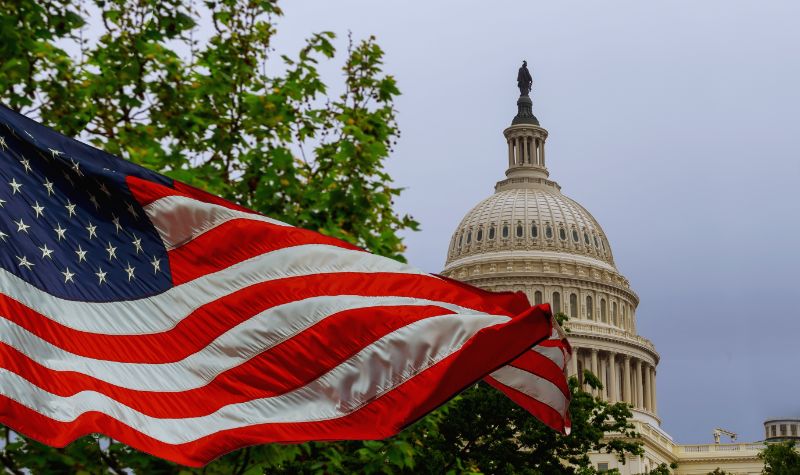Every year, the AKC Government Relations Department (AKC GR) tracks and responds to dozens of federal bills and proposed regulations that could impact our rights as dog owners to breed our dogs responsibly and participate in our sport.
GR also tracks approximately 2,500 bills and regulations each year that impact dog owners at the state and local level. However, federal legislation carries particular weight because passage of even a single anti-breeder bill in Congress could wipe out hundreds of breeding programs—and our sport as we know it.
Recently, AKC GR put out an urgent alert urging all club members, exhibitors, owners, and breeders to contact their member of Congress in opposition to two anti-breeder bills that animal rights/ “protection” groups are seeking to pass by including them in the 2023 farm bill. If you haven’t done so yet, please take action. Fancier involvement is urgently needed to stop the animal-rights supported Puppy Protection Act (H.R. 1624) and Goldies Act (H.R. 1788).
Recently, AKC GR put out an urgent alert urging all club members, exhibitors, owners, and breeders to contact their member of Congress in opposition to two anti-breeder bills that animal rights/ “protection” groups are seeking to pass by including them in the 2023 farm bill.
About The Farm Bill
Although dog bills typically don’t top the charts of concerns in Congress, once every five years, the threat of extensive federal canine legislation expands exponentially. Most federal legislation and regulation impacting dog breeders, including breeder licensing programs, are administered by the U.S. Department of Agriculture. U.S. Agricultural programs, which include nutrition and food security, represent an enormous chunk of the federal budget. It’s so large (approximately $500 Billion over five years), that budgetary reauthorization for USDA programs occurs only once every five years, in a bill simply known as “The Farm Bill.” And 2023 is the year.
The Farm Bill funds crucial programs so it’s “must-pass” legislation. As a result, just about every interest with a related bill recognizes the farm bill as an opportunity to attach their own favorite projects to the bill. Extreme animal rights or “protection” (AR) groups (and many other mainstream organizations) are no exception. This year, groups such as the Human Society of the United States (now simply calling themselves “The Humane Society”); the Animal Wellness Action Network, a new extreme animal group led by Wayne Pacelle; and the ASCPA are among the groups with high-powered lobbyists and coffers into the millions pushing legislation that could harm all breeders and particularly devastate small hobby breeders.
Understanding the Context of AR Lobbying & Legislative Impact
Lobbyists for animal extremist groups and others have been trolling the halls of Congress since the beginning of the session, but they’re prioritizing two anti-breeder bills: the Puppy Protection Act (H.R. 1624) and Goldies Act (H.R. 1788).
Among the unsupported claims made by these groups is that there are “tens of thousands of puppy mills” in the United States (in fact, 10,000 is the approximate number of breeders regulated by USDA, underscoring the AR narrative that considers any kennel subject to USDA licensing a “puppy mill”). Another claim they make is that bills would not impact responsible or hobby breeders. This is also false.
To understand the impact of this legislation and the false narrative put forward by AR groups; consider who is subject to USDA licensing, and likewise, who these groups are targeting as “puppy mills.” If you’ve ever maintained more than a few intact female dogs and/or cats and shipped a puppy sight unseen, you could be affected.
For more information, and to see if you are subject to USDA licensing click here.
The Puppy Protection Act (H.R. 1624)
This bill seeks to add new, arbitrary, one-size-fits-all mandates to federal Animal Welfare Act (AWA) regulations governing breeders subject to USDA licensing. It could require hobby breeders to build and place their dogs in industrial, commercial-style kennels, and undermine quality breed-based care. Though labeled as commercial breeding regulations, the one-size-fits-all requirements also apply to some small hobby breeders (see fact sheets).
Specifically, it establishes government mandates that:
Prohibit the breeding of a female dog:
- Unless pre-screened by a veterinarian. No specific details are provided on what the screening would involve or who would make these decisions.
- Based arbitrarily on the age and size of the dog.
- If it would produce more than two litters in an 18-month period.
Additional arbitrary requirements include, but are not limited to:
- Mandates “unfettered access” from dogs’ primary enclosures to an outdoor exercise area large enough that it “allows dogs to extend to full stride.” This would create a potentially dangerous environment for multiple dogs that do not get along, accidental breedings, other poor animal management practices, etc.
- Mandated annual dental exams.
- Mandated indoor space sufficient to allow the tallest dog in an enclosure to stand on his or her hind legs without touching the roof of the enclosure. For family dogs that live in their owner’s homes, a primary enclosure may be considered the dog’s sleeping crate.
- Prohibition on the keeping of dogs in enclosures above 85 degrees or below 45 degrees F, regardless of breed or acclimation needs for dogs that hunt, sled, detect explosives, or do other work and thrive in cooler temperatures, or that must be acclimated to cooler or warmer temperatures for their safety.
- Completely solid flooring, despite scientific recognition that multiple types of high-quality flooring, including engineered slatted flooring, is beneficial in certain types of kennels and with certain breeds.
Why This is a Problem
While some portions of the measures include reasonable generalized guidelines for canine care, arbitrary requirements that ignore best practices for individual outcomes are not appropriate for federal mandates. One-size-fits-all requirements do not take into account the broad range of breeds and types of dogs, or best health and breeding practices. They also do not allow for creative approaches that permit expert breeders and owners to provide optimal care for their individual dogs and advance the art and science of responsible dog breeding. Arbitrary restrictions can be expensive and undermine small hobby breeding programs because of an overly-broad definition of “breeding female” that impacts who is subject to federal requirements.
To learn more, see and share:
Proposal Would Undermine Animal Welfare, DC Journal, April 20, 2023
Breeder Expertise, Thoughtful Analysis Demonstrate Dangerous Flaws in ‘Feel Good’ Dog Law.
Goldie’s Act (HR 1788)
Establishes Government Mandates that:
- Redefine AWA violations and undermine priority for the care and well-being of animals by removing a distinction between care and welfare (direct) violations and paperwork/non-welfare related (indirect) violations. While zero violations of any rules or laws should be the goal, the care and wellbeing of animals must always be a priority. Reporting paperwork errors in the same manner as care violations also creates a misleading perception about breeder licensees and creates a new target for animal extremists who use those public databases to identify breeders.
- Require inspectors to destroy or remove an animal if they believe it is in “psychological distress.” The bill does not determine how “psychological distress” would be determined or by whom. This creates an environment for abuse and unnecessary euthanasia of animals.
- State the intent to expand enforcement of federal breeder licensing requirements, but in fact throw out recent enforcement enhancements currently in the middle of a three-year implementation process. Instead of improving enforcement of the AWA, it creates confusing and onerous new mandates, and undermines recently established enforcement efforts. Constantly changing arbitrary rules creates a confusing, expensive, and potentially harmful environment for animal care in which neither licensees nor regulators may be certain of requirements.
Who These Bills Apply To
Anyone subject to USDA breeder/dealer licensing. Breeders are subject to USDA licensing if they maintain more than four (4) “breeding females” (a term that is undefined but is generally considered to mean an intact female) and transfer even one of the offspring “sight unseen.” “Breeding females” include any combination of cats, dogs, or other small pet mammals such as hamsters, guinea pigs, etc.
Your Involvement is Crucial! Here’s an Easy Way You Can Make a Difference.*
Your member of Congress needs to hear from you. Please call, email, or write to your member of Congress today. Visit AKC’s Legislative Action Center and scroll down to the box on the right rail (Find Officials). Type in your address in the “Find Your Elected Officials” box to find out who represents you and get their contact information.
Tell them:
- Ask them to oppose the Puppy Protection Act (H.R. 1624) and Goldies Act (H.R. 1788) because their one-size-fits-all mandates undermine animal well-being and enforcement of the Animal Welfare Act. These bills are “feel good” proposals developed without the experience and scientific expertise of breeder experts. The one-size-fits-all requirements fail to recognize the diversity of licensees and the types or breeds of dogs impacted, and could harm some dogs.
- Explain you are a constituent. Respectfully share your experience and concerns as a dog owner/breeder/expert and based on the talking points above. Breeders: Relying on your experience, explain in practical terms how the new mandates could adversely impact your breeding program.
- Ask them to not support advancing the Puppy Protection Act or Goldie’s Act in committee or in the Farm Bill. Tell them, despite claims being made by AR groups, these bills do impact responsible
small breeders.
- Ask them to instead support additional financial resources for USDA so they can appropriately enforce the requirements they already have.
- If you can, let the AKC GR team ([email protected]) know that you contacted your lawmakers and if you received any response.
Taking action today can help protect the future of our breeds, our sport, and the integrity of responsible, expert breeders. Your voice does make a difference!
For questions or more information, contact [email protected], visit AKC’s Legislative Action Center or contact 919-816-3720.
*This information was previously published as an AKC Legislative alert on 4/26/23.









